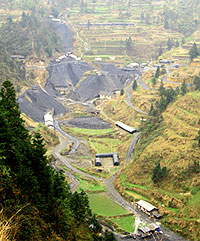Yale Environment 360 reports that residents of Gaodong in the Manganese Triangle are rising up against the air pollution caused by manganese mining.
In early 2008, residents of Gaodong — a hamlet of 278 people nestled in the picturesque Wuling Mountains of south-central China — invited the head of the surrounding township
to listen to a list of grievances about the manganese mining they claimed was ruining their community. Living in a county that produces one-fifth of all the manganese excavated on earth, the villagers had — like many ordinary Chinese — paid a high environmental price for fueling China’s economic boom. In this instance, however, the people of Gaodong had decided they would take it no more.
Gaodong is located in Xiushan, a county that is home to 41 licensed and more than 200 unlicensed manganese mines, which excavate the valuable metal — used in steel, aluminum, and copper production — by blasting the earth with dynamite. The residents of Gaodong and neighboring villages have been subjected to frequent explosions that crack the foundations of their homes and force their children to stuff cotton in their ears to do their homework. They have seen their underground aquifers drained by the mining activity, which empties all six of the village’s wells in the dry season. Their rivers sometimes run black as the mining companies and manganese refineries dump tons of toxic mine waste directly into surrounding waterways. They have watched as badly polluted irrigation water destroys rice crops, kills fruit trees, and cuts harvests by more than half. In addition, the village air has been fouled with mining dust, and local health officials have diagnosed some local mine workers with neurological diseases caused by heavy metal pollution.
[…] Today, an uneasy standoff exists in the village. No charges have been filed against Gaodong residents, and some mines have paid modest compensation to villagers. But the clash remains a striking example of the rising anger felt by many Chinese fed up with the egregious pollution that is the byproduct of their country’s dizzying economic rise. The conflict in Gaodong also testifies to the growing resentment of the corruption that often goes hand-in-hand with pollution, as the very officials who are supposed to be policing the manganese mines often have financial interests in the enterprises. As the People’s Representatives Standing Committee in Xiushan County delicately put it, the mining industry is “disorderly, with interests distributed across many parties.”
In addition to the corruption on different levels of the government, the government faces strong resistance against mining regulations from the maganese mining companies, according to an earlier post on CDT.








